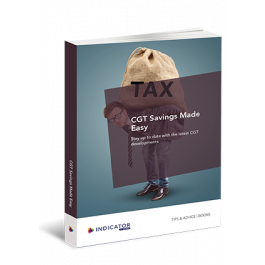CGT Savings Made Easy
Stay up to date with the latest CGT developments
A Tips & Advice Special Report about...
In a nutshell
This Special Report covers the fundamentals of capital gains tax (CGT) and explains the key changes to the rules, including the cuts to the annual tax-free amount. Read how they affect you, plus benefit from valuable advice on how to minimise your CGT bill under the current regime.
In detail
In recent years the CGT rules have undergone more changes than those for most other taxes. Small business owners and those with second homes or buy-to-let properties have been singled out for special treatment. This Special Report brings together all the important changes, including:
- The private residence relief rules
- Business asset disposal relief (previously entrepreneurs' relief) and goodwill
- When and how the different tax rates apply
- Anti-avoidance rules for business owners
- How to claim investors’ relief
- The social investment tax relief scheme
This Special Report not only explains what’s changed but includes valuable tax planning tips and advice about the current CGT regime. Plus, you’ll receive an online service including a CGT calculator and documents such as a CGT loss planner.
We've created this Tips & Advice Special Report especially for...
Individuals who buy and sell assets, business owners, second home or buy-to-let property owners that want to:
- Be fully up to date with all the recent changes to capital gains tax
- Cut their CGT bill
Accountants, bookkeepers and tax advisors that want to:
- Provide accurate tax-planning advice under the CGT regime
You'll get the following free extras with this Tips & Advice Special Report...
An online wervice with ready-to-use documents
- To immediately apply our advice and solutions in practice
- That you can easily adapt to suit your own requirements
In this Tips & Advice Special Report you'll read about...
1. What is capital gains tax?
1.1. What are capital gains?
1.2. Does CGT apply to all types of asset?
1.3. What are capital losses?
1.4. When does a capital gain or loss occur?
1.5. How do I work out the tax due?
2. Capital gains tax rates and payments
2.1. What are the different CGT rates and when do they apply?
2.2. Gains relating to residential property
2.3. What recent changes have been made to capital gains tax?
2.4. What rate of tax do companies pay on capital gains?
3. Private residence relief
3.1. What is private residence relief?
3.2. How does private residence relief apply to the final period of ownership?
3.3. Are there restrictions to PRR?
3.4. Restrictions in more detail
3.5. How is PRR affected if I delay moving into a property?
3.6. What if I own two or more homes?
3.7. What is letting relief and how did it change in April 2020?
3.8. How was PRR changed for transfers between spouses?
4. Investors’ relief
4.1. What is the tax relief for investors?
4.2. Are there restrictions to IR?
5. Business asset disposal relief (BADR)
5.1. What is BADR?
5.2. What’s the limit for BADR and when did it change?
5.3. How and when can I claim BADR?
5.4. What are the qualifying conditions for BADR?
5.5. How do the rules apply to non-voting shares?
5.6. Do I need to be an employee of a company to qualify for BADR?
5.7. How does BADR apply to associated disposals?
5.8. What are the conditions for associated disposals?
5.9. What are the time limits for associated disposals?
5.10. What restrictions can apply to associated disposals?
5.11. What effect on BADR does paying rent have?
5.12. Can BADR apply to gains made on assets transferred to my business?
5.13. Does BADR apply to assets owned by trustees?
5.14. How does BADR interact with EIS and SITR?
5.15. What’s the CGT position for sales or transfers of goodwill?
5.16. Are there alternatives to BADR when I sell goodwill to company?
5.17. What are the BADR anti-avoidance rules?
6. Social investment tax relief
6.1. What is SITR?
6.2. Do all charities meet the conditions for SITR?
6.3. How did SITR work?
6.4. How do BADR and SITR interact?
6.5. How long must I own SITR shares?
6.6. Which businesses qualified for SITR?
7. Seed enterprise investment scheme
7.1. What are seed investments in companies?
7.2. Are there conditions for SEIS companies?
8. Assets owned at March 1982
8.1. What’s the significance of March 1982 for CGT purposes?
8.2. Do the same rules apply for companies?
8.3. How do I work out the base cost?
8.4. What are incidental costs?
8.5. What if I didn’t pay anything for the asset?
9. Identifying share sales
9.1. What’s meant by pooled shares?
10. Capital gains rules for companies
10.1. How are company gains taxed?
10.2. How do group company losses work?
10.3. What are pre-entry losses?
10.4. Is buying tax losses a commercial transaction?
10.5. How do the loss rules work?
10.6. Indexation for companies frozen
11. Appendices
11.1. Appendix 1 - Corporate bonds
11.2. Appendix 2 - Business asset disposal relief - transfer of shares to spouse
11.3. Appendix 3 - HMRC clearances required in relation to a company takeover etc.
12. Documents and tools
12.1. Capital gains tax calculator
12.2. Capital gains tax loss planner
12.3. Election for business asset disposal relief to apply to QCBs
12.4. Business asset disposal relief checklist
12.5. CGT negligible value claim
12.6. Nominating a main residence election
You can choose from the following options...
Paper
- The hard copy version
- Keep it on your desk or use it whenever you're offline
Digital
- The PDF-version
- Delivered to your inbox
Take a look at your options below.
Special subscribers' offer
£90.00
£70.00
Only if you already have a subscriptionStandard offer
£90.00
Special subscribers' offer
£90.00
£70.00
Only if you already have a subscriptionStandard offer
£90.00

Got a question? Call Customer Services
(01233) 653500


 (01233) 653500
(01233) 653500 







